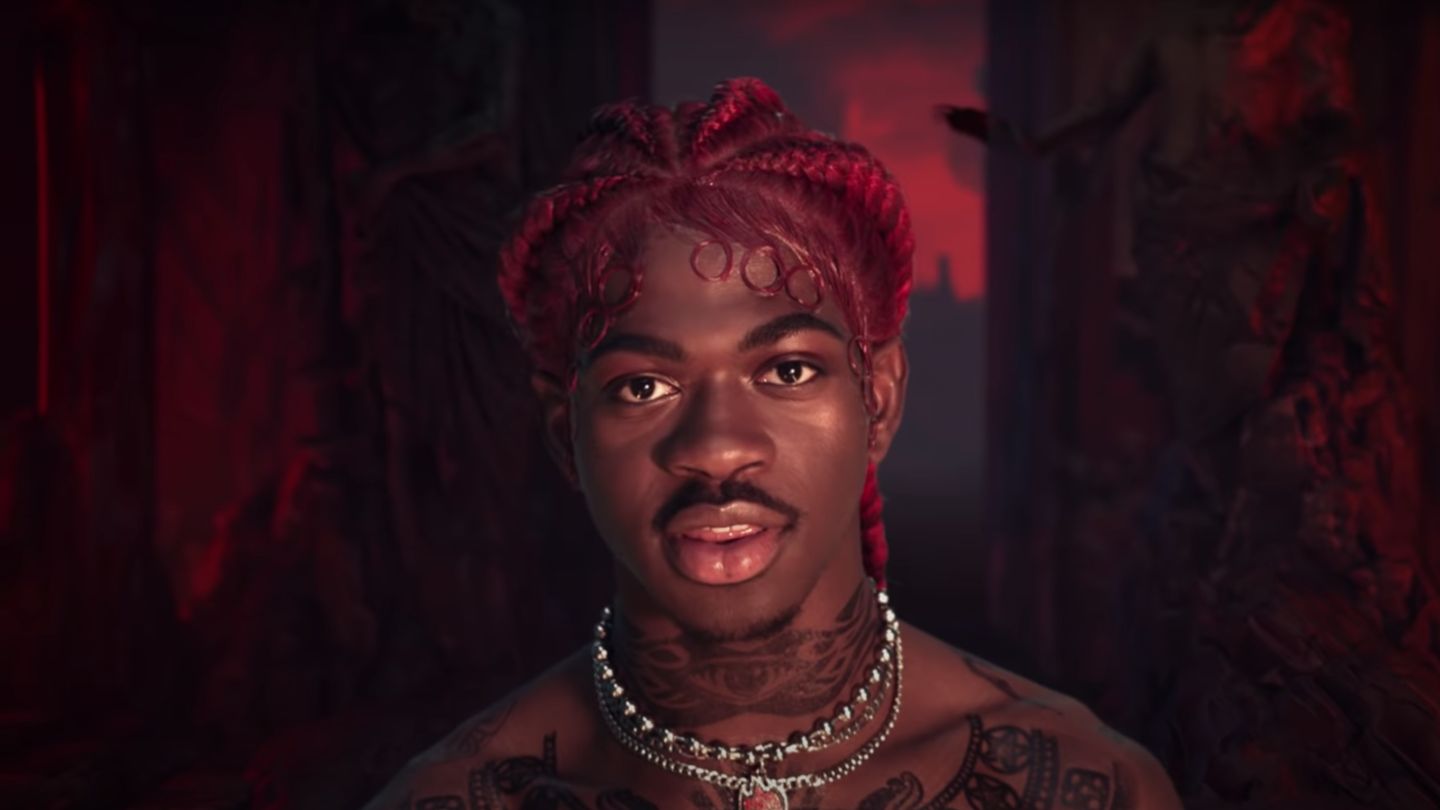By Da’Shan Smith
First thing’s first: “Montero (Call Me By Your Name)” is another bona fide banger from Lil Nas X.
Now, let’s briefly address the controversy surrounding the song’s music video. Gay Black artist slides down a pole to hell after being sentenced for a steamy makeout session with an alien snake? Check. That artist happens to be wearing androgynous costumes, colorful wigs, skintight latex, and manicured acrylics? Check. After arriving in hell, said artist gives Satan a scandalous lap dance? Check. Right-wing pundits suspecting the gay agenda and sacrilegious ideology are plaguing the mainstream and, therefore, negatively influencing children? Check. Check. Check.
The music video for “Montero” is a textbook media spectacle. It’s already following the “WAP” effect, where Cardi B and Megan Thee Stallion caused a ruckus in their sex-positive Willy Wonka factory of moist “macaroni in a pot.” Their world of gyrating choreography, Mugler-designed pasties, and unexpected cameos from the likes of Normani, Rosalía, and Kylie Jenner celebrated variations of womanhood, body positivity, and sexuality.
It’s as if mainstream artists know how to use a certain formula now: release a catchy song on the pulse of trends and a stunning video that showcases their most polarizing traits, then reap the rewards of the inevitable culture clash. Like Cardi B mockingly confesses at the end of her No. 1 smash “Up”: “Look, got to play it safe / No face, no case!” But there’s beauty in the video for “Montero” in its newly liberated expression of identity — one that Nas X says he’s yearned to sing and visualize since age 14.
But the video’s controversies distract from the musicality of the song itself. Judging by its No. 1 peaks on iTunes and Spotify in its debut week thus far, there are fans who believe, simply, that it’s a banger — so much so that they are spending $1.29 on the audio-only MP3s and streaming in the millions without watching the contentious clip. Sure, that discourse will most likely lead to higher listening numbers (something Lil Nas X himself understands better than anyone), but the key to charting is consistency. And Lil Nas X is starting to show cohesiveness in his sound as he conquers his own lane of pop music, inspired by the genre-blasting inherent to its hyperpop influence.
When Lil Nas X debuted “Old Town Road” in December 2018, what started as a TikTok trend and Twitter meme turned into a viral hit. Because of those origins, the overnight Columbia Records label deal and re-release in March 2019, and the oh-so shocking idea of a Black man singing country music and then fusing trap into it, “Old Town Road” was initially taken as a parody, even as it eventually achieved a record-breaking 19 weeks atop the Billboard Hot 100.
Although hyperpop’s cacophony of random noises and infectious looping effects served as a base for the sonics of his eventual debut project, 7, the EP served a melting pot of genres and brooding tones, as heard on “Panini,” which swapped country for a punk chorus amid its digitized cadences, and the Cardi B-assisted “Rodeo.” There was a childlike quality to the lyricism and the instrumentation on 7. Many took that to be a sign of an artist not taking his craft seriously. But the inflection mirrored the angst of a queer person struggling to grow up and come out. Off-kilter rock fuels each track — even the coveted banjo sample of Nine Inch Nails’s “34 Ghosts IV” on “Old Town Road.” On 7, Lil Nas X is a dark, lonely soul facing adversity in being his true self.
There are music listeners who detest the packaging of pop, but still subscribe to the giant ways in which it defines popular culture. But it becomes even more perplexing to experience hyperpop, a variation of pop music that’s dominated by queer talent and thinking. As some critics suppressed the genre’s seriousness in the 2010s, a scene bubbled in popularity underground. In 2014, genre pioneers Sophie and A.G. Cook played London basements while Charli XCX threw a Clueless prom-like rave at New York’s Webster Hall. In 2015, Holly Herndon received widespread critical acclaim for her album, Platform. Flume’s 2016 album, Skin, won the Grammy for Best Dance/Electronic Album.
The proto-success of hyperpop calls back to the techno and industrial house scenes of queer Black artistry in the Midwest — particularly, Detroit techno duo Drexciya. They were reinventing and resurrecting the sound of disco for a new age of technology and a raving party scene of the late 1980s into the early ’90s. An entire scene emerged of afrofuturism intersecting, resulting in mainstream pop acts like Grace Jones.
Trace the trajectory of underground electronic music for almost 30 years, and things are different on the mainstream tip. At the moment, the artist who stands tallest on the scene owing to this rich history is Lil Nas X. By this stage in his career, a pop icon has eased into the art of conceptual storytelling. If 7 served as the coming-out story, then fans have started speculating that his forthcoming debut album might document his tales of being out and sexually active, balancing romance with international fame.
The first single, “Holiday,” flirted with the singer’s proclivities over a trap beat, trolling the tropes of Christmas music. “I might bottom on the low, but I top shit / Switch the genre on you hoes, do a rock hit,” raps an artist selling game to the public. Although “Holiday” didn’t see the commercial success of “Old Town Road,” “Panini,” or “Rodeo,” a Tay Keith production credit shows that Lil Nas X’s hyperpop and cyberpunk has clout in hip-hop.
“Montero” is more aggressive than earlier works, the “rock hit” foreshadowed by the first verse of “Holiday.” The track’s key songwriters and producers include the twosome Take a Daytrip that was also behind “Panini,” and Roy Lenzo. Another is Omer Fedi, who is on the pulse of the pop-punk’s present fusion with hip-hop, as heard on Iann Dior and 24kGoldn’s “Mood.” Similar sensual energy and a lustful flamenco beat pervade “Montero,” which is underscored by guitar plucking and rhythmic clapping.
On it, Nas X begs for that phone call to link up with the one he envies, a closeted romantic partner whose eluding his own sexual demons. He wants to hear “I love you” during secret pillow talk but has yet to receive a response. Haunting the track is harmonious humming, as if the unrequited love is being reflected back at him. One could read the melodramatic ambiance and themes as a successor to Rosalía’s “Malemente.” Lil Nas X has transformed into a Thanos of modern pop, merging genres for artist-defining statements. Like Drake or Rihanna, Lil Nas X exhibits how he can musically and artistically maneuver through waves. He’s mastered the art of trolling the masses; now, it’s time to dive deep into the music.







